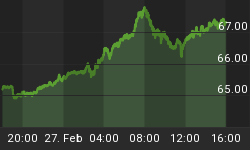Global central banks have promised to pump an unprecedented amount of money into the system. They are trying to mollify the effects from a global contraction in GDP and the growing likelihood of a war between Israel and Iran.
Bloomberg recently reported that Israeli Prime Minister Benjamin Netanyahu told U.S. Defense Secretary Leon Panetta on August 1st that "time is running out" for a peaceful solution to Iran's atomic program. The Tel Aviv-based newspaper Haaretz also reported on August the 10th that Netanyahu and Israeli Defense Minister Ehud Barak are considering bombing Iran's nuclear facilities before the presidential elections in the U.S. In addition, Shlomo Brom, a former Israeli army commander said the nation is now actively planning civil-defense measures including implementing a text messaging system to alert the public to missile attacks, mass distribution of gas masks for their population and bomb-shelter drills for students returning to the class room, the newspaper Yedloth Ahronoth reported on August 15th.
A war in the Middle East would send oil prices soaring towards $200 per barrel, which would immediately usher in a severe worldwide recession. Central bankers are preparing now to help ease the pain at the pump. Unfortunately, their strategy to lower oil prices is to massively depreciate their currencies. Therefore, that will only further exacerbate the problem by sending energy prices even higher.
But even if another war in the Middle East can be avoided, the global economy continues to suffer and that will cause further central bank intervention. U.S. regional manufacturing surveys released this week indicate a significant deterioration in economic activity is now occurring. The Empire State Manufacturing Survey dropped 13 points and fell into negative territory for the first time since October 2011. And the Philly Fed Survey came in at -7.1 for August, which was the fourth negative reading in a row.
Meanwhile, S&P 500 companies are reporting Year over Year revenue growth that is barely positive and is predicted to post a negative 0.7% in the third quarter. China's industrial production has now contracted for seven quarters in a row, and Japanese GDP fell sharply to 1.4% in Q2 from 5.5% in the first quarter. Europe is faring even worse as Italian GDP dropped 2.5% YOY and their public debt jumped to a record 2 trillion Euros. French GDP growth came in at zero and German GDP growth fell from 0.5% in Q1 to just 0.3% in the current quarter.
Additionally, unemployment rates in Europe and the U.S. continue to climb. Portugal's unemployment rate hit a Euro-era record 15% and Spain's unemployment rate rose to 25%. The Federal Reserve has a mandate to bring down our 8.3% unemployment rate and the European Central Bank feels that the rising number of those without work is a deflationary threat, which goes against their mandate of providing stable prices as well.
The stock markets in Europe and the U.S. have been rising on the promise of more central bank easing and European bond yields have come down in anticipation of those ECB purchases. "Help" has been guaranteed by ECB head Mario Draghi in the form of giving the European Stability Mechanism a banking license to purchase insolvent government debt. And Boston Fed President Eric Rosengren is urging the U.S. central bank to commit to an unprecedented amount of money printing.
A growing possibility of war in Iran and the worsening economies in Europe and the U.S. have caused central banks to prepare investors for another round of money printing. The time has now arrived for the Fed and ECB to either follow through on their threats or to sit back and watch as equity shares plummet and bond yields in Europe soar. If central banks launch the assault on their currencies, I expect gold and energy prices to increase sharply. In that case precious metal and energy shares should fare the best. However, in the unlikely event that the month of September ends without any action on the part of the ECB and Fed, I would expect a significant retracement in all global markets and especially in commodity prices.















